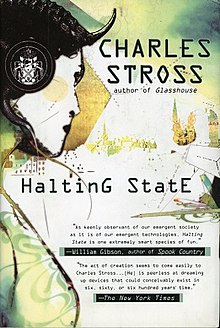 *Spoilers Below*
*Spoilers Below* It's hard to write what I want to about this book without giving away a lot about the plot and the tricks that Stross has up his sleeve. I'm going to go ahead and talk about it regardless, but if you're worried about broad spoilers (nothing too specific, I promise), this might not be the review for you.
Several years ago now, I was involved with an ARG (Augmented Reality Game). In the beta I worked on, we leaned more heavily on the real-life aspects, using the internet to supplement game play, but most of what happened happened in the real world. It was intensive, a ton of work, and a great deal of fun. Two weeks, and we were exhausted. I don't know how you could possibly take what we did and make it for larger consumption, and indeed the next iterations demanded a lot less of the game runners as the game was going on.
Still, having done the small amount I've done in the field, when Stross' story started to move away from an online heist of a digital in-game bank towards the ways in which technology and gameplay permeate our lives, my ears pricked up. I'm fascinated by the process, slightly suspicious of the potential, kind of itching to do it again.
Let's move on to Scotland and this book, then. In an independent Scotland, the digital heist takes place. The local cops are called in, which pisses off some in the company, and forensic auditors from the insurance company are hot on their heels, trying to avoid paying out. One forensic auditor, a European swordfighting enthusiast, hires a local computer programmer to be her guide into the world of the game that was robbed.
The book moves around frequently between four or five different viewpoints, and honestly, for a while, I was enjoying it, but not really absorbed into the world Stross was creating. This was reminding me of his other books that I find somewhat opaque, as opposed to the ones that I have enjoyed a whole hell of a lot. But then when we started to get to the ARGs, and the suggestion that a huge computer-based one might have been co-opted by one or more national security agencies, outsourcing spy work to people who truly have no idea what they've signed up for, not to mention who might be pulling the strings, then it finally clicked for me.
It's a fascinating idea in the sort of way that makes you slightly queasy with how not only plausible but sort of inevitable it feels. If ARGs were to hit the mainstream (and Pokemon GO was the first step in that direction), you start to wonder what's being done with the digital data and traffic, or what might be done, and whether or not you'd ever know about it.
Our ARG had nothing more nefarious in mind that getting people to learn about the War of 1812 while providing an adventure, but the ideas Stross is exploring extrapolate on what little I know in truly terrifying ways. And how do local cops deal with being told to get off the turf of national secuity agencies, when the foes they're fighting might just have very local impacts in addition to large international ones.
So yeah, once this book hooked me, I was well and truly hooked. It took a while, and it was more for the ideas than the characters, but it ended up being a book I was glad I'd read.
No comments:
Post a Comment